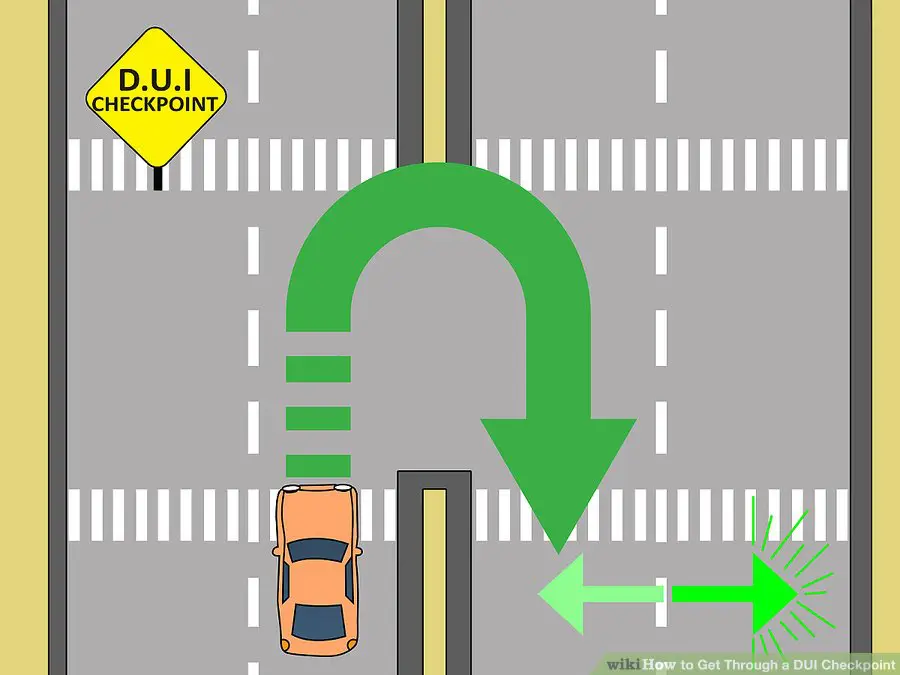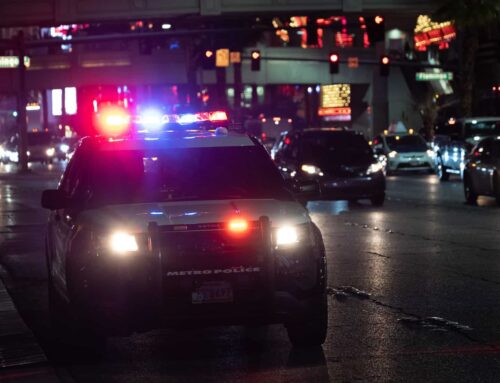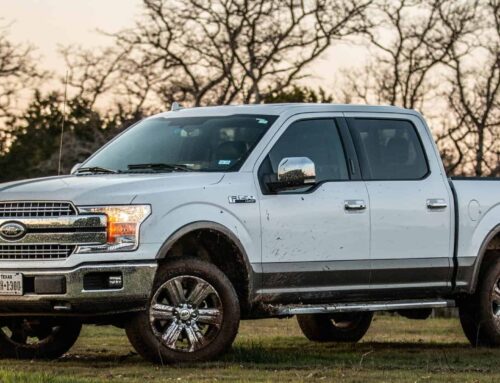Getting Through A DUI Checkpoint
Getting Through A DUI Checkpoint – In some states, police set up roadblocks and stop drivers to search for signs of intoxication. If the officers have reasonable suspicion that you are driving under the influence, they will ask you to pull over to investigate further. Generally, your encounter will last less than a minute, during which the officer may ask to see your driver’s license and registration. They will also probably ask if you have been drinking. If you are pulled over for further questioning, you can protect your rights by remaining silent and declining a field sobriety test.

Passing Through the Checkpoint
-
Avoid the checkpoint if possible. You aren’t legally required to go through a checkpoint if you see one up ahead. Instead, you can pull onto a side road or do a U-turn, if legal.
- Don’t break the law to avoid the checkpoint. For example, you must use proper turn signals, drive at a safe speed, and observe all other traffic laws. If you don’t, then the police have a reason to pull you over. And once you are pulled over, they can give you a chemical test if they suspect you have had too much to drink.
- The police will scrutinize any vehicles that evade the checkpoint, so make sure to drive properly.
-
Slow down as you approach the checkpoint. Once you see the checkpoint up ahead, you should slow your vehicle. You cannot speed through the checkpoint, which will give the police reason to chase you down and pull you over.
- Many police now disguise checkpoints as construction zones. For example, they will put up orange cones and construction signs. This is done to prevent you from avoiding the checkpoint.
- In some states, police must advertise where they will set up checkpoints. For example, they may publish a notice in the newspaper. You can also download apps, such as PhantomAlert, that will alert you of DUI checkpoints.
-
Guess how much you’ve been drinking. If you haven’t been drinking alcohol, you have nothing to fear from a DUI checkpoint. However, you might have been drinking. If so, be aware the police can ask you to pull over, where they will administer a field sobriety test or a breath test. The legal blood alcohol concentration (BAC) in all 50 states is 0.080.
- Generally, a 160-pound person will have a BAC of 0.080 after four drinks. A drink is 1.5 ounces of hard liquor, 5 ounces of wine, or 12 ounces of beer.
- By contrast, a 120-pound person will have a BAC of 0.081 after consuming three drinks.
- Other factors influence your BAC, such as whether you had the drinks with a meal and when you drank them.
-
Roll down your window. You should cooperate during the DUI checkpoint. This means coming to a complete stop and rolling down your window. If you don’t, then the officer’s suspicion might increase that you are hiding criminal activity.- The officer will want to bend down close to your window so that they can take a peek inside and also smell your breath. If you are transporting anything you don’t want the cops to see, it should be stowed under your seats.
- You can try to mask alcohol on your breath with a breath mint. However, alcohol is in your lungs after you drink, and the “alcohol breath” you smell comes up from your lungs when you breathe. A mint might mask some of the smell but only briefly.
-
Hand over your license. You must show that you are legally allowed to drive in your state, so you will need to hand over your driver’s license and registration. You should have them handy so that you aren’t fumbling to find them.
- A cop might interpret fumbling as lack of coordination due to alcohol consumption. Make sure you have your registration and license nearby so you can easily hand them over.
- You may also have to turn over proof of insurance, so have it nearby as well.
Choose whether to admit to drinking. The purpose of the checkpoint is to find drunk drivers, so you can expect the officer to ask you if you have been drinking. You have a constitutional right not to answer.However, if you haven’t been drinking, then you should admit that: “No, officer, I haven’t been drinking.”
- If you have been drinking, you probably are best of saying simply, “I don’t want to answer that.” Remember not to argue or be rude.
- When answering, look away from the officer. If you talk, the officer will try to get a good sniff of your breath. If they detect alcohol, then they will ask you to pull over for further questioning.
- Avoid saying, “I only had one drink” or “I stopped drinking several hours ago.” Any admission of drinking could be used against you.
-
Do not consent to a search. Although checkpoints are legal in many states, the police are limited in what they can do. Nevertheless, some officers might push their luck. For example, they might ask if they can search your car or trunk. Politely decline: “I’m sorry. No.”
- The officer also might stick their head into your car or point a flashlight into it and wave it around. They are not supposed to enter your vehicle at the checkpoint. Politely ask them not to invade your space or wave a flashlight around.
-
Drive away when given permission. If nothing goes wrong, you should be sent on your way in less than a minute. The average checkpoint stop lasts about as long as a red light at an intersection.
- Remember not to drive off until the police officer tells you it is okay. When in doubt, ask, “Can I leave now?”
- Observe all traffic rules as you pull away. Don’t speed or make sudden movements. Use your blinker.
Undergoing Further Questioning
-
Pull over, if requested. When you go through the checkpoint, the police can ask you to pull over if they have a reasonable suspicion of criminal activity (such as drunk driving). As a rule, they cannot ask you to pull over unless they have this suspicion.
- From the moment the police ask you to pull over, you must understand the police are in control of the situation. You should generally comply with their requests—unless you have a valid reason not to.
- Try to remain calm throughout the encounter. The more nervous you are, the more suspicious you will look. Take a couple of deep breaths as you pull your car over.
Choose whether to take the field sobriety tests. These tests usually involve walking on a white line or balancing on one foot. In many states, you are not required to take these tests. However, the officer might arrest you if you decline. The problem with these tests is that many sober people fail them.
- If you have been drinking, you really don’t want to give the officer more evidence to use against you.Accordingly, you should politely decline. Say, “I’m sorry, my lawyer has advised me against taking these tests.”
-
Consider taking a chemical test. You aren’t required to take a breathalyzer or other chemical test, either. However, there may be negative consequences for declining. You should think carefully about your choice.
- For example, you could lose your license for a certain amount of time. Driving is a privilege, not a right. And your state can make a driver’s license conditional on your consent to chemical tests. These are called “implied consent laws.” In California, for example, you can lose your license for up to a year if you decline.
- You might want to decline if you already have a DUI on your record. There’s no reason to give the police more evidence to use against you.
- Even if you decline, the police can get a warrant for a blood test, which they can administer against your will. So refusing a chemical test might only buy you some time.
-
Remain silent. You aren’t required to answer any questions other than to identify yourself by handing over your license. Refuse to do any kind of verbal test, such as counting backwards or reciting the alphabet backwards. You might think you can talk your way out of a ticket, but you’d be wrong.
- Also don’t provide details about how much you have been drinking. Instead, say, “I don’t recall” or “I haven’t been drinking.”
- You can also clarify you won’t be answering any questions. You can say, “I’m sorry, officer, but my lawyer has advised me to remain silent when pulled over.” Then stay silent. Simply smile if the officer asks another question.
-
Ask if you can leave. The officer cannot hold you indefinitely. If your BAC comes in under the legal limit, the officer should let you go.Furthermore, the officer can only arrest you if they have probable cause that you broke the law.
- Asking to leave is not the same as taking it upon yourself to leave. Don’t throw the car into drive and pull away. Don’t even walk away from the officer. Instead, stand there and ask if you are free to go.
- If the cop ignores your question, continue to ask it: “Can I leave now?” Always remain polite but persistent.
-
Request a lawyer if arrested. The police might arrest you if they have probable cause to believe you were driving while intoxicated. If so, you should continue to refuse to answer their questions. Furthermore, you should explicitly say, “I want a lawyer, and I won’t answer any questions until I have a lawyer present.”
- Police must stop all questioning once you request a lawyer. However, you can’t voluntarily start talking about the incident. If you do, the police can start up the questioning again.
-
Call a lawyer. Once taken to the police station, you’ll be booked. This usually involves turning over personal belongings and having fingerprints and your picture taken. At some point, you should be given a chance to call a lawyer using a phone at the jail.
- If you don’t know the name of a lawyer, then call someone who you know is home. Ask them to get an attorney and tell them where you are located.
- Some stations might have a list of lawyers you can look through.
- If you aren’t given a chance to call a lawyer, then you might be able to ask for one when taken before the judge for your initial appearance or arraignment.
- When you talk to your lawyer or family on the phone, admit nothing. The jailhouse phones are usually bugged.



















